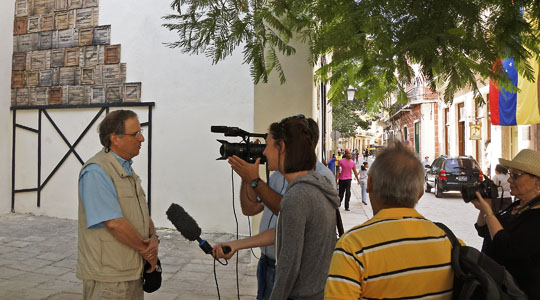
If you take in one of Roanoke’s sidewalk art shows, including the recent Art in the Alley on Jefferson St., you may have come across the photographs of Barry Wolfe. A periodontist by trade (think oral “gum work”), Wolfe has been interested in photography since he was in college at the University of Kentucky. Cuba has been on his radar screen since a college roommate married a Cuban native.
Wolfe started shooting pictures commercially in 1997 and on his website (bwolfephotography.com) visitors can view (and purchase) high-resolution shots he has taken in locales around the world – Africa, Europe, Egypt, Australia, South America, Antarctica and yes, even his home town of Roanoke.
“We travel places that interest me photographically or culturally,” said Wolfe. “Our goal is to do the bizarre trips first and work our way towards the center, when we’re limited to bus trips,” quips the sixty-something Wolfe.
The trip to Antarctica involved a cruise from South America. “Its really strange,” he recalled of his trip to the bottom of the earth. And it’s not all ice either, but a “huge land continent.” Wolfe’s pictures of that isolated land – taken at the tip of the continent only, there were no long slogs to the pole – are stark and beautiful. “The quietist and strangest place I’ve ever seen.” He also visited the remote Peruvian base in Antarctica, where “everyone was miserable.”
Wolfe has now won a number of “Best Of” awards for his work – from the Sidewalk Art Show, the annual Roanoke Rescue Mission show and out of town shows in the southeast where he has exhibited.
The ability to “look at things differently” as he does can be natural or developed. Wolfe takes pride in using natural light and shapes, bringing scenes or people to life with a somewhat different take. Roanoke as a place to shoot pictures is “great,” because there are four balanced seasons with a mixture of cultures and scenery, according to Wolfe.
Last spring Wolfe and his wife Libba took an eye-opening trip to Cuba, the Communist country to the south of Florida. Travel to Cuba, which has been under sanctions imposed by the United States over 50 years ago, is restricted, but the Wolfes were able to go since loosened guidelines were put in place by the Obama administration. The Bush White House had placed further restrictions on travel, but a recent cultural program made the Wolfe’s trip possible.
Tourist trips through a licensed company offered guided excursions to Havana and other cities that were somewhat restricted on where and when they could go. Still, Wolfe saw many people who had traveled to Cuba illegally, something that has been going on for a long time. Some make their way through Canada, where travel to Cuba for residents is legal. Republican U.S. Senator Marco Rubio (Florida) has now questioned the cultural value of those trips to Cuba, so Wolfe fears the travel restrictions could be tightened again in the future.
Pressure from a “relatively small group” of Cuban exiles in Florida has always exerted an “overwhelming” amount of power on U.S. policy towards Cuba, according to Wolfe. “It affects all of the [national] elections, it seems like.”
In any case, the Wolfes had “a great time” on their guided tour. He noted that they were more free to run around by themselves at night in Havana and the other cities they visited than during the day. (The tour guides weren’t too happy he said when Wolfe was interviewed by BBC television on the street.)
The local residents they met “were great, universally. There was no ugly American thing. My overwhelming feeling was that they would like to have stronger relations with Americans. Many of them have relatives in America. Some of those people were on the Delta charter flight with the Wolfes from Miami.”
Cuba is like a time machine – older American cars that predate the Castro revolution in the 1950’s are the staple of transportation and infrastructure and buildings are badly in need of repair. There’s little commerce and there are lots of people who simply “walk the streets.”
But the Caribbean island is also awash in places with color, such as the buildings painted in bright pastels. “Gorgeous scenery . . . a rare gem . . . the most photographic-friendly place I’ve ever been,” said Wolfe, who found Cuba and its people a treat for his camera lens. “[But] you would need about 400 bulldozers to fix Havana, it’s just awful.”
The other argument about Cuba is that lifting restrictions on commerce and travel with the United States might give residents there a taste of freedom and democracy. “All of us felt there was no reason why travel [and] relations shouldn’t be opened up.” Wolfe’s photographs (available soon on his web site) are one small way to open that closed society to Americans.
by Gene Marrano

